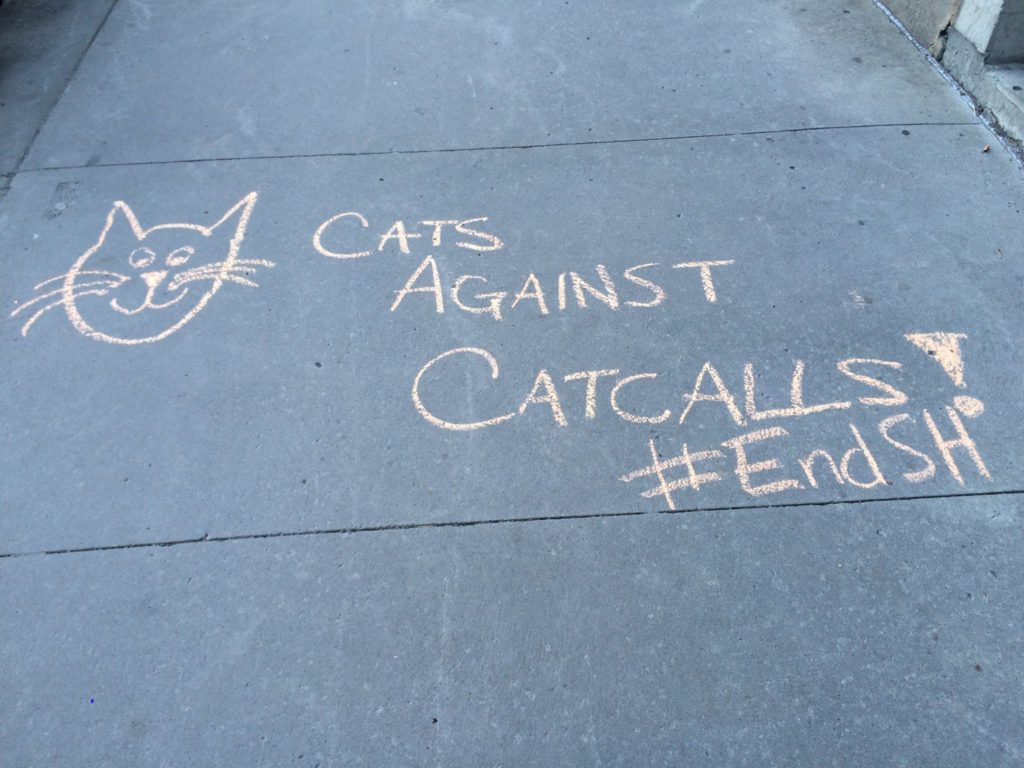
A talk with Kathryn Travers from Women in Cities International on Street Harassment and Urban Development
Alexandra Jurecko, Montreal, Canada, SSH Blog Correspondent
“Montreal is a lot safer than other cities, for women in particular,” says Kathryn Travers, “I can walk home alone, be at the office late, go by myself, and that’s a real privilege and freedom I have here.” However, daily forms of street harassment, such as catcalls and unwanted comments, are still a common occurrence. “We all know it. It starts off as a comment but where does it go next? It’s that quick moment when you think you’re given a compliment that, if the expectation that comes with it is not met, turns into anger and could quickly turn into violence.”
 Kathryn is the executive director of Women in Cities International, a Montreal-based international network promoting gender equality and inclusion in urban environments. With a Bachelor’s degree in Criminology and Sociology and a Master’s in International Peace Studies and Conflict Resolution, Kathryn says she’s always been interested in gender issues. Then, while working at the International Centre for Prevention of Crime in Montreal from 2004 to 2006, Kathryn was introduced to Women in Cities International (WICI). In 2008, she officially joined WICI’s ranks and has stayed ever since: “The thing with working on gender issues, and specifically on women’s safety issues and street harassment is once you open your eyes to it, you can’t close them. Your understanding of what in our culture enables those things becomes broader and broader and then you just get more pissed off.”
Kathryn is the executive director of Women in Cities International, a Montreal-based international network promoting gender equality and inclusion in urban environments. With a Bachelor’s degree in Criminology and Sociology and a Master’s in International Peace Studies and Conflict Resolution, Kathryn says she’s always been interested in gender issues. Then, while working at the International Centre for Prevention of Crime in Montreal from 2004 to 2006, Kathryn was introduced to Women in Cities International (WICI). In 2008, she officially joined WICI’s ranks and has stayed ever since: “The thing with working on gender issues, and specifically on women’s safety issues and street harassment is once you open your eyes to it, you can’t close them. Your understanding of what in our culture enables those things becomes broader and broader and then you just get more pissed off.”
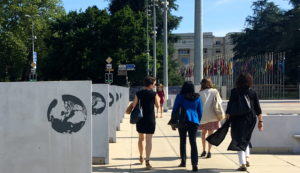 WICI knows the importance of documenting street harassment. As part of their Gender Inclusive City Program (2009-2012), the organization has collected some of the first data on street harassment as it relates to the lack of women’s safety in urban contexts. “That was ground-breaking and really quite alarming,” says Kathryn. In looking at contributing factors of gender exclusion in urban contexts, WICI highlights women’s experiences of sexual assault and harassment in public spaces.
WICI knows the importance of documenting street harassment. As part of their Gender Inclusive City Program (2009-2012), the organization has collected some of the first data on street harassment as it relates to the lack of women’s safety in urban contexts. “That was ground-breaking and really quite alarming,” says Kathryn. In looking at contributing factors of gender exclusion in urban contexts, WICI highlights women’s experiences of sexual assault and harassment in public spaces.
“In Montreal, street harassment seems more subtle than in some places, but definitely, there are a lot of comments. During International Anti-Street Harassment week this year,” remembers Kathryn, “I walked into the metro and this guy with his hands down his pants told me ‘Smile, Beautiful’, and I was like, ‘Really? On this day of all days?’ It was like scripted”.
 Street harassment starts at a young age. During the 2014 Anti-Street Harassment Week, WICI conducted workshops with elementary school girls in Montreal. According to Kathryn, “much of the conversation was about street harassment. They were in grade 5, so about eleven years old, and all of them had stories. It was pretty shocking actually.”
Street harassment starts at a young age. During the 2014 Anti-Street Harassment Week, WICI conducted workshops with elementary school girls in Montreal. According to Kathryn, “much of the conversation was about street harassment. They were in grade 5, so about eleven years old, and all of them had stories. It was pretty shocking actually.”
“Being followed, not feeling safe, walking alone. Everyone has their own techniques, like crossing the street when you see someone walking your way, keeping your phone in hand or your keys. Virtually all women have a series of things they do, but men don’t and never even think about it,” explains Kathryn stressing that talking about these experiences can be eye opening.
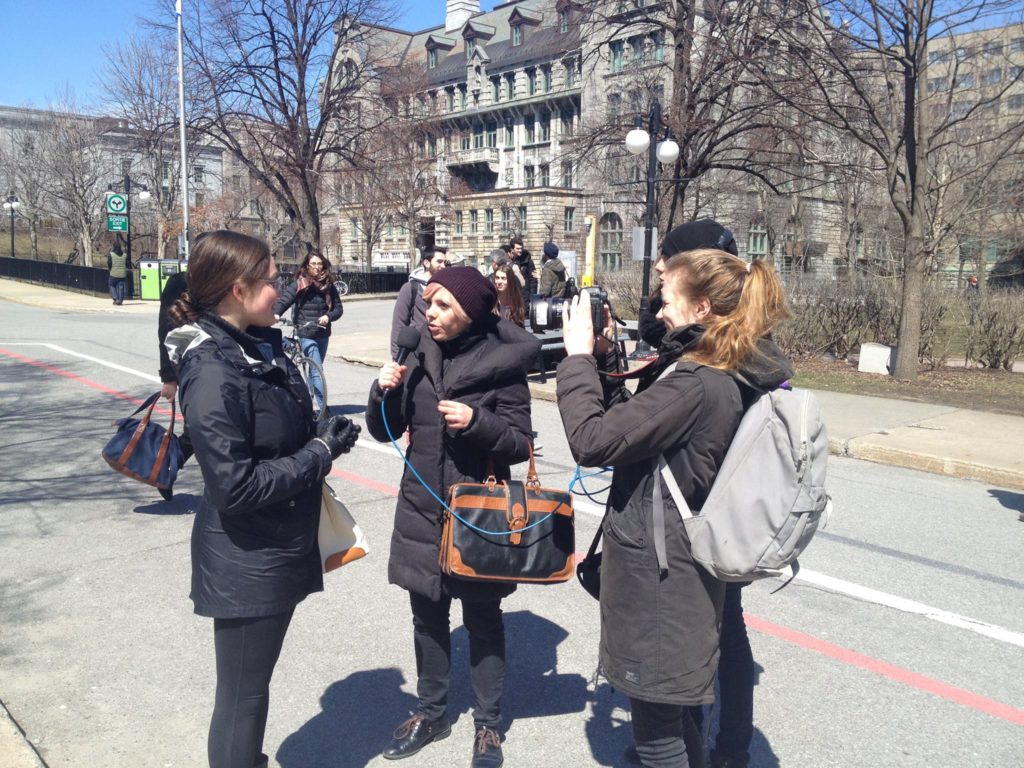
“One thing we usually do with this kind of work, even with adolescents, is we separate boys and girls for this conversation,” says Kathryn. Afterwards, the points of discussion are shared within the entire group, and the boys are shocked: “They have no idea that how they speak to girls makes them feel the way it does. There is a huge disconnect. The sense of vulnerability that girls and women feel isn’t something that is shared by many men and boys.”
Kathryn sees many of the reasons for sexual harassment grounded in our culture: “I feel like we almost teach this to our kids. The whistling, for example, that’s even in cartoons. There is a level of ignorance there, but I think it’s cultural. I think it is the way our culture is and it’s by not speaking about these issues, by not making people aware and by not making people understand how others feel as a result of them”. For Kathryn, opening the conversation and introducing issues like street harassment into the dialogue is vital: “Acknowledgement is the first step. Of course, there is much work to do. It’s everywhere in your everyday, even in a city like Montreal.”
Alexandra is a freelance writer and recent graduate of Heidelberg University in Germany, where she earned a BA in South Asian Studies and English Literature. Having moved across the pond to live and work in Montreal, she now focuses on refreshing her French skills while volunteering her time to various community-outreach programs. You can follow her on twitter @alexjurecko.


 This event
This event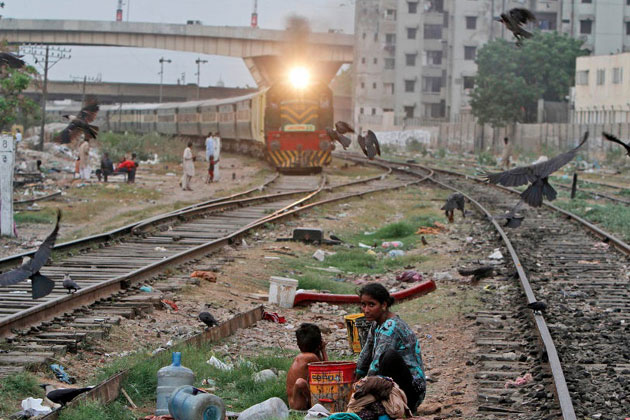
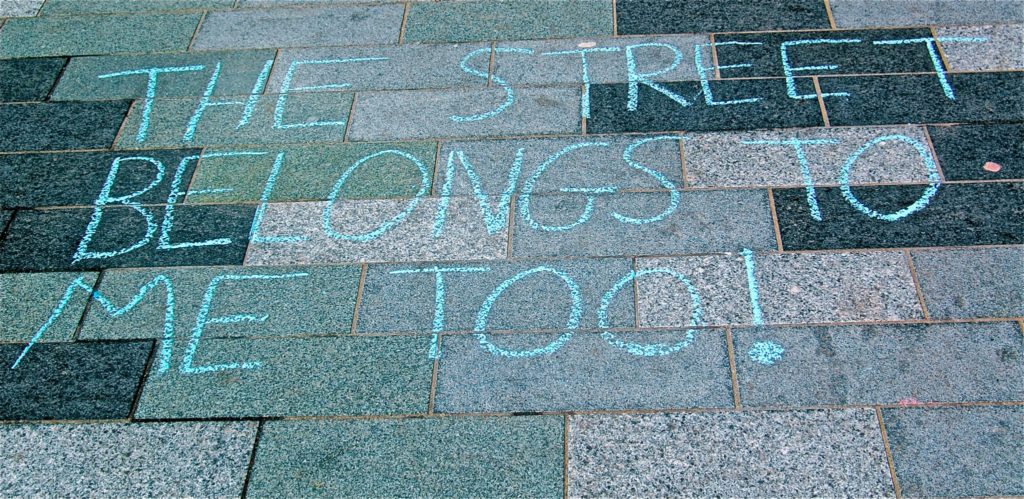 Street harassment is always an unpleasant experience. Catcalls, whistles, instances of being followed or grabbed in public places, inevitably leave victim feeling scared, threatened or embarrassed. What is perhaps even more disturbing is that most women experience street harassment for the first time as children. Young people often fall victim to a particularly malevolent form of harassment because of their increased vulnerability: they are more likely to be startled by a passing car screaming obscenities, more likely to be rattled by a sexist or degrading comment, and more likely to be coerced by a man who won’t take no for an answer.
Street harassment is always an unpleasant experience. Catcalls, whistles, instances of being followed or grabbed in public places, inevitably leave victim feeling scared, threatened or embarrassed. What is perhaps even more disturbing is that most women experience street harassment for the first time as children. Young people often fall victim to a particularly malevolent form of harassment because of their increased vulnerability: they are more likely to be startled by a passing car screaming obscenities, more likely to be rattled by a sexist or degrading comment, and more likely to be coerced by a man who won’t take no for an answer.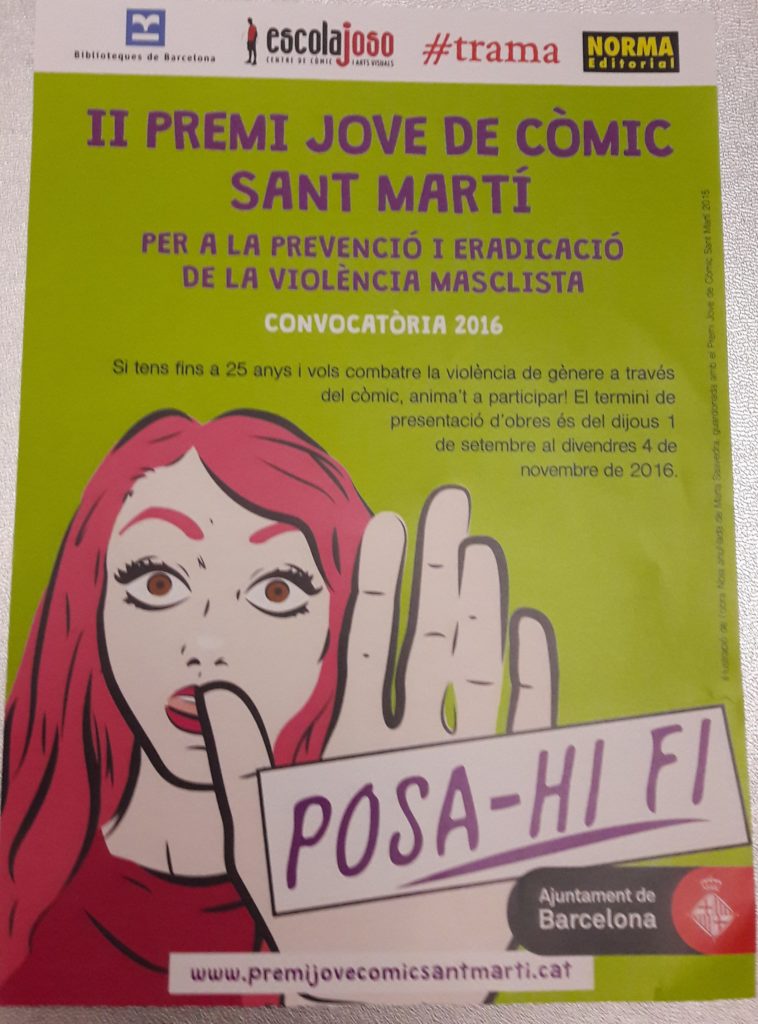 For many people, Barcelona is the sunny, party city by the sea. And it is true that the city offers a large range of activities throughout the year (and not only parties and night clubs, by the way), but some events are bigger than others.
For many people, Barcelona is the sunny, party city by the sea. And it is true that the city offers a large range of activities throughout the year (and not only parties and night clubs, by the way), but some events are bigger than others.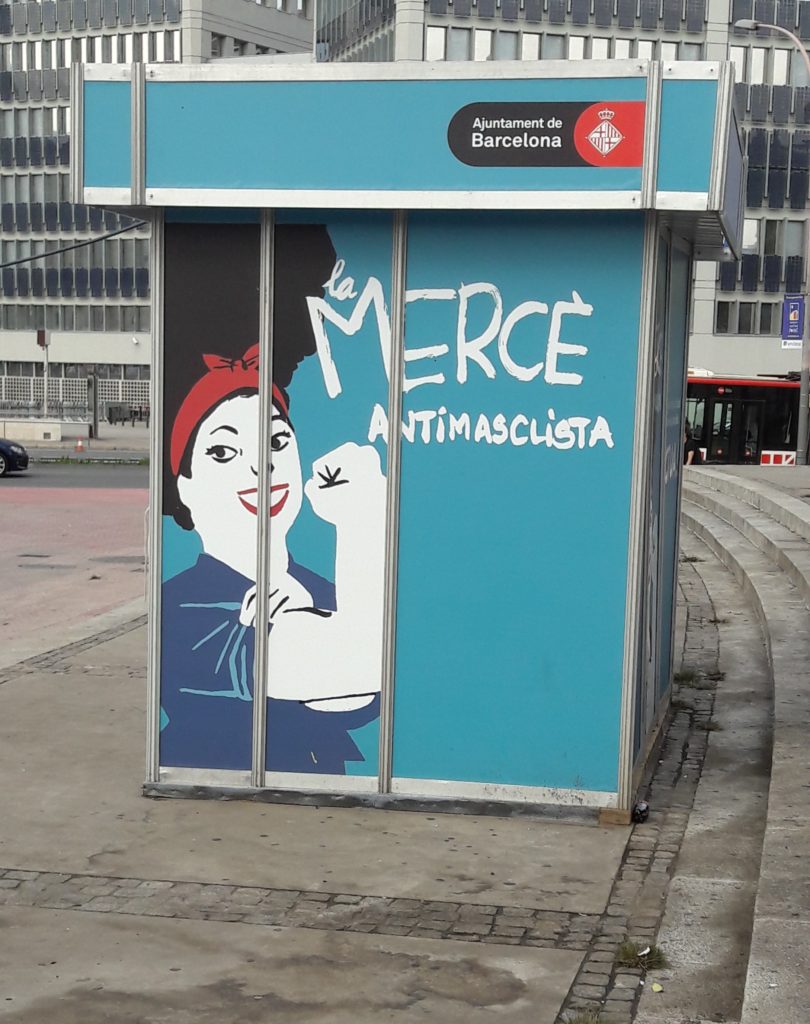 These are just two examples where one occurred during a big wild and controversial festival and the other happened at night to a public figure. And that is an issue by itself. It seems that only specific assaults are revealed and discussed, those that happen at night, during wild parties when we perfectly know that assaults can also (and mainly) occur by day, on the way to work and can be committed by an acquaintance. It is important to recognize that the stories in the media about sexual violence are only the top of iceberg.
These are just two examples where one occurred during a big wild and controversial festival and the other happened at night to a public figure. And that is an issue by itself. It seems that only specific assaults are revealed and discussed, those that happen at night, during wild parties when we perfectly know that assaults can also (and mainly) occur by day, on the way to work and can be committed by an acquaintance. It is important to recognize that the stories in the media about sexual violence are only the top of iceberg.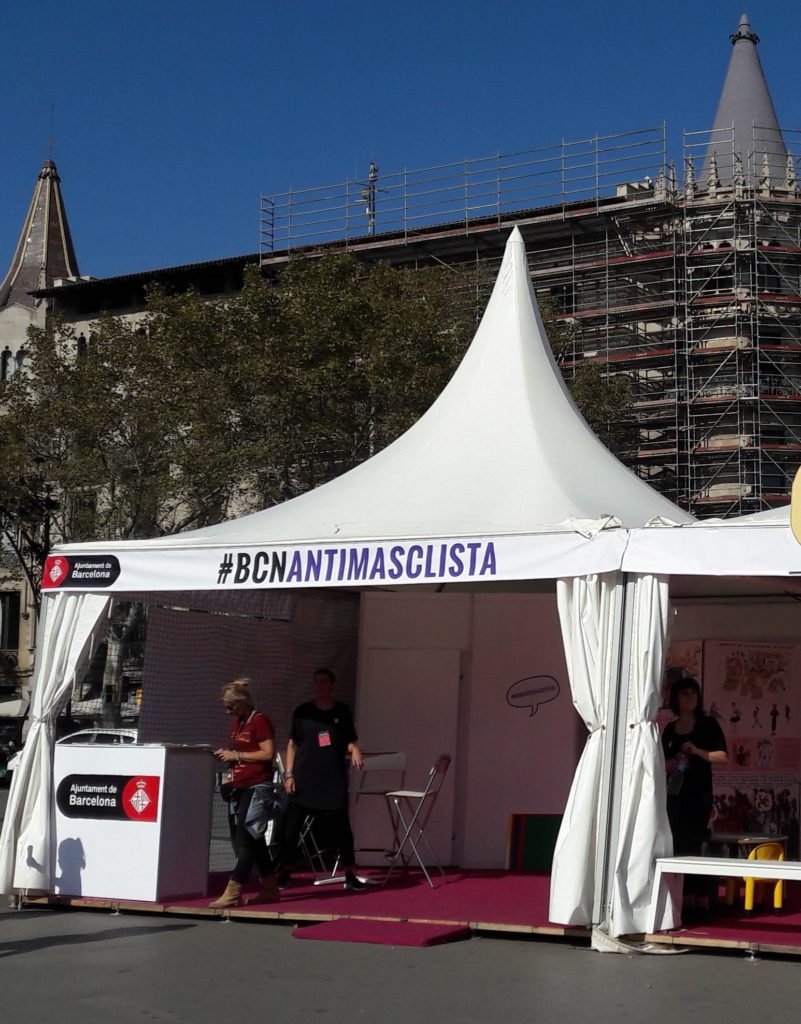 I was out celebrating for La Mercé and I must say it was quite comforting to see two stands where I could get information about all the different associations of the city and which one I should contact in case of sexual assault, domestic violence, physical and/or psychological abuses, where I could get a hotline number in case of emergency, where I could report any incident. When looking all the leaflets and ask for general information I could speak with someone who asked me if I needed some specific information or help and where I could make a test to see if I were in an abusive situation and which organization I should contact if so. I know these organizations and I got help from some of them. They are doing a wonderful job but not everyone knows them and this makes the issue visible and makes it easier to speak out.
I was out celebrating for La Mercé and I must say it was quite comforting to see two stands where I could get information about all the different associations of the city and which one I should contact in case of sexual assault, domestic violence, physical and/or psychological abuses, where I could get a hotline number in case of emergency, where I could report any incident. When looking all the leaflets and ask for general information I could speak with someone who asked me if I needed some specific information or help and where I could make a test to see if I were in an abusive situation and which organization I should contact if so. I know these organizations and I got help from some of them. They are doing a wonderful job but not everyone knows them and this makes the issue visible and makes it easier to speak out.